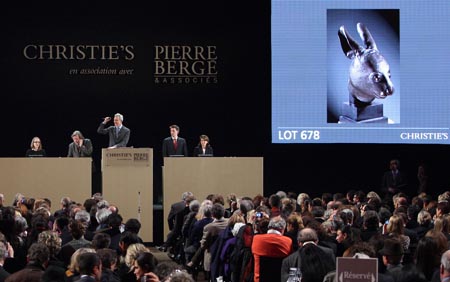For art's sake or patriotic duty
Wealthy Chinese who purchased stolen antiques and returned them to China were described as patriotic sons and daughters of the country. However, an official at the Ministry of Culture said such well-meaning gestures are not the best way to rescue the country's relics.
 |
|
The Christie's auction where the bronze rat and rabbit heads, two of the 12 animal heads that formerly guarded the Imperial Garden, was sold in February 2009. |
Lü Lixin, an artifacts appraiser at the ministry, made the comment after a porcelain from the Qianlong-era (1711-99) was sold at the Bainbridges Auctioneer in London for a whopping 53 million pounds ($85 million)Thursday. It is believed that the buyer is a Chinese businessman.
"If we cannot achieve this through such means, why not just leave the relics abroad and take them as a way to promote Chinese culture?" Lü said.
More than 10 million Chinese cultural relics have been taken overseas illegally. Most of them were stolen and shipped out of China before the founding of the People's Republic of China. About 1.67 million pieces of relics are housed in more than 200 museums in 47 countries and regions, and there are 10 times more in the hands of private collectors, the overseas edition of People's Daily reported earlier.
Some people have encouraged overseas Chinese with money to buy back the relics, but Lü said it is unnecessary. He told the Global Times that the relics should be claimed back through legal and diplomatic channels.
On the same day that the Qianlong vase was auctioned off, a Beijing resident paid 2.7 million pounds ($4.3 million) for a seal that belonged to the Qianlong Emperor. The sale was conducted by Bonhams Sale of Fine Chinese Art in London, china.com reported yesterday.
A European collector bought the seal half a century ago and gave it to his son who decided to put it up for auction. However, the auction house said they had no information on how and when the item left China.
During a Sotheby's auction in Hong Kong last month, two Qianlong vases were sold to a Shanghai woman for HK$141 million ($18.2 million) and HK$251 million ($32 million)respectively.
Patriotic duty
A blog run by a reporter at the Financial Times raised the issue Friday. The writer said that the increasing willingness of Chinese bidders to fork over large sums of cash sometimes take on a hue of patriotism.
Nicolas Chow, who runs the Chinese art section at Sotheby's told the blogger, "The history of China in the 20th century explains why people are trying to rebuild their own history. Collecting art is one of those things that helps them rebuild their identity and reclaim their culture."
 0
0 






